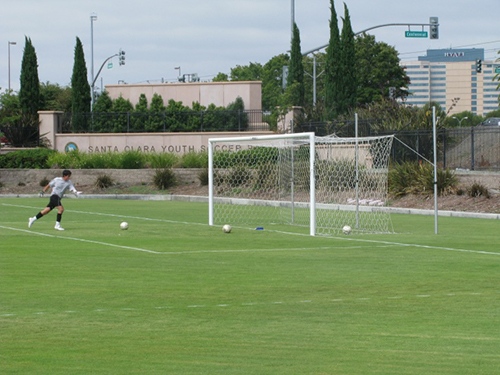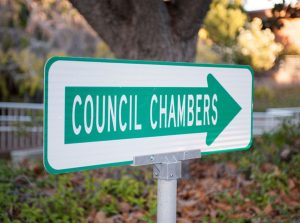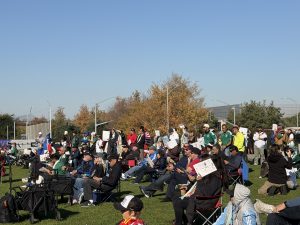

Tuesday afternoon, Santa Clara County Superior Court Judge Joseph H. Huber denied, for the second time in less than a week, Santa Clara Youth Soccer League’s (SCYSL) request for an injunction to stop NFL construction of a Super Bowl 50 media “village” on the Santa Clara Youth Soccer Park. The park is part of a group of City properties adjacent to Levi’s Stadium that were promised in the City’s 2013 bid for the sports mega-event.
Over the past week there has been an avalanche of legal actions over the park.
On Dec. 30 SCYS filed a lawsuit to block the NFL use of the Santa Clara Soccer Park as a media “village;” demanding that the City “immediately cease and desist from illegally turning over the premier Santa Clara Youth Soccer Park to the National Football League unless and until the City furnishes suitable replacement fields.” Construction was slated to begin Jan. 4.
Unless the Court intervened by Jan. 4, the complaint says, “the ability of hundreds of South Bay high-school scholar-athletes to complete for college scholarships and admission will be placed in severe jeopardy.” One of the scholar-athletes is SCYSL VP Steve Robertson’s son, whose “ability to complete excel and qualify for college scholarships and admissions” would be compromised by the “the NFL’s takeover of the Youth Soccer Park.”
On Dec. 31, Judge Huber denied a request for an emergency injunction blocking the NFL from occupying the fields before a final decision in the case; one reason reportedly was that the NFL, legally, an ‘indispensible party’ to the case – wasn’t named in the lawsuit. The SCYSL returned on Jan. 4 with an amended complaint naming the NFL. The hearing on the merits of the complaint is currently scheduled for Jan. 11.
SCYSL again asked the court to issue an injunction preventing further NFL activity on the fields; bringing everyone back to court for another emergency hearing on Tuesday morning. “Times have changed,” said SCYSL’s attorney Gautam Dutta on Tuesday morning. “The NFL has control over the park,” he said, and “one field is already destroyed.” The “destruction” – widely repeated Monday in news outlets and social media – was the removal of sprinkler heads to prevent damage to them, according to City officials.
Santa Clara officials see this litigation differently.
“At the eleventh hour, with neither law nor evidence, the Petitioner [SCYSL] seeks an order that could have potentially serious consequences to the Super Bowl,” the City wrote in its opposition, “an event that the Petitioner and the Petitioners Declarants all say is of profound value to the City of Santa Clara.
“Then,” the City’s reply continues, “blowing hot and cold, the Petitioner on the one hand seeks a complete injunction against the use of the Soccer Park for any non-soccer purpose, while simultaneously and cynically admitting that its real concerns were not about permit violations but rather that the City provide it with additional alternative facilities.”
Because the City didn’t actually ink the agreement until Dec. 24, 2015, no action could be brought earlier, according to Dutta.
The lawsuit came more than two weeks after the Santa Clara City Council gave final approval to temporary use agreements with the NFL for using city properties for Super Bowl events – and nearly three years after Santa Clara made its Super Bowl bid, committing “facilities and premises, access roads, thoroughfares and other areas that may be used for the purpose of organizing, promoting, accommodating, staging and conducting a Super Bowl and its related events.”
During this time, “SCYSL failed to complain or otherwise object to the City’s planned use for the Youth Soccer Park,” the City said its response to the lawsuit. All of the currently sitting Council Members except Dominic Caserta approved the 2013 bid.
The soccer league makes three charges against the City.
First, it claims that City law doesn’t allow the Council to allow another use of the park without first obtaining a new use permit and conducting a public hearing – per Santa Clara City Code section 18.52 for “public, quasi-public and public park facilities.” The SCYSL asserts that the existing conditional use permit (CUP) for the soccer park, approved at the Nov. 14, 2001 Planning Commission, allows only one use for the park, youth soccer. This use permit question was first raised at the Dec. 15, 2015 Council meeting.
The City’s counters that, as a charter city under California law, Santa Clara has inherent authority to “control, govern and supervise its own parks” and has unconditional authority over decisions that aren’t expressly forbidden by the state constitution or its charter terms. California courts have consistently upheld this principle, the City’s brief continues, “that … no narrow and strict construction should be applied to limit the city in the uses to which the [park] property … may be devoted.”
The City says that nothing in the City Charter, zoning ordinance, nor the soccer park’s CUP prohibits using the soccer park for other purposes besides youth soccer. The 2001 Planning Commission meeting minutes describe the park as “a multi-field soccer facility … planned to serve youth soccer only, including primarily Police Athletic League and Santa Clara Youth Soccer.”
Second, the SCYSL’s complaint charges that members of the soccer league were denied their right to due process under state law because they didn’t get the opportunity to defend their right to the soccer park at a public hearing held specifically under City Code Section 18.
The City’s response is that such hearings are only required when the Council must make a judgment – for example, whether to issue a use permit – but not to take actions that are legislative – levying a prescribed fine, for example. Further, “because the SCYSL has never held a legitimate claim of entitlement to the CUP …it cannot assert a valid claim for violation of due process rights.”
The third complaint is that “to date the City has refused to find suitable replacement fields” for the league. According to SCYSL’s website, it uses a number of local fields for its games and practice: Bowers Park, Cabrillo School, Curtis Field, Kings Academy School, Central Park School, Millikin Elementary School, Pomeroy Elementary School, and Sutter Field.
The City has signed an agreement to use Twin Creeks sports center in Sunnyvale, but the SCYSL doesn’t consider these fields suitable because they are already booked on weekends, and are 10 to 20 yards smaller than FIFA specifications for soccer pitches. However, FIFA permits smaller field sizes according to the age and abilities of players. The City is also discussing replacement field arrangements with other parties, including Kings Academy.
What’s at stake for Santa Clara in this? “The evidence is overwhelming that without the Soccer Park,” says the City’s response, “the City’s ability to meeting the stringent … requirements of the Super Bowl will be greatly prejudiced, potentially impairing crucial preparation for the Super Bowl.”
The battle in case number 15-CV-289572 continues on Monday at 10 a.m. in Superior Court Dept. 21, in the San Jose’s old courthouse.












0 comments